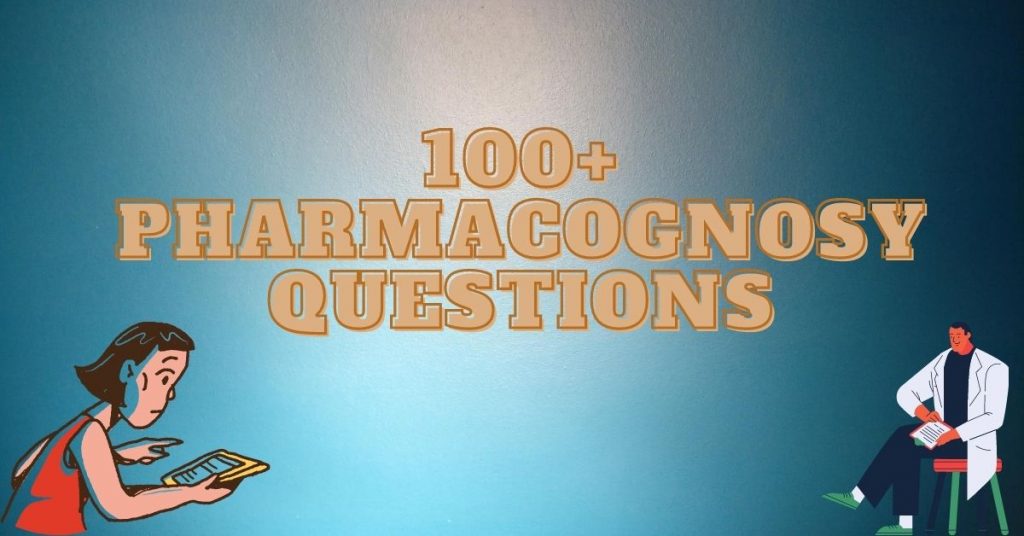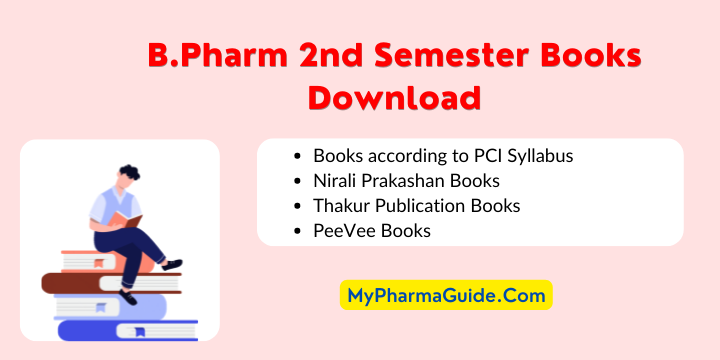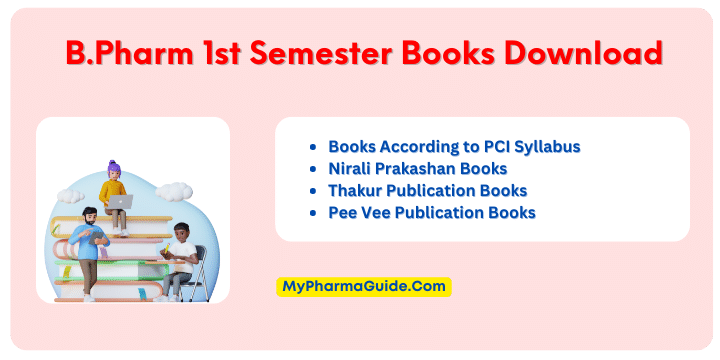Get Latest Updates About Pharmacy Notes, Books and Many More
100+ Important Pharmacognosy Questions For B.Pharm and D.Pharm stduents. This post contains important questions of Pharmacognosy for B.Pharm 5th Semester students. Students of D.pharm can also use these questions for thier university or any competitive exams.
100+ Important Pharmacognosy Questions.

Important Pharmacognosy Questions
Unit I: Metabolic pathways in higher plants and their determination
10 marks
- Explain different methods for elucidation of biosynthetic pathways
5 marks
- Write a note on Shikimic acid pathway and its significance
- Write a note on radio isotopes and their applications in biogenetic studies
- Explain the steps involved in acetate pathway
- Explain Tracer technology and its significance in biogenetic studies
- Mention different methods for biogenetic investigations and explain tracer technology
- Explain Grafting and Mutant strain methods of biogenetic studies
- Write a note on radio isotopes and their applications in biogenetic studies
- Describe Autoradiography and competitive feeding
- Write a note on tracer technique and its significances.
2 Marks
- Define secondary plant metabolite with suitable examples
- Give the significance of acetate pathway
- Write a note on autoradiography
- Write a note on Amino Acid Pathway
- Autoradiography
- Liquid scintillation counter
- Competitive feeding experiments
- Define radioisotopes and give their uses in biogenetic studies
Also See This: Pharmacognosy Notes For B.Pharm and D.Pharm Students
Unit II Secondary Metabolite Pharmacognosy Questions
10 Marks
- What are cardiac glycosides? Give the Pharmacognosy of Digitalis in detail
- Write Pharmacognosy of Liquorice
- Write the Pharmacognostical study of Senna
- Write the biological source, morphology, microscopy , chemical constituents, uses , adulterants and substitutes of Rauwolfia
- Write the biological source, morphology, microscopy , chemical constituents, uses , adulterants and substitutes of Belladonna
- Write Pharmacognosy of Liquorice
- Write Pharmacognosy of Cinnamon
- Pharmacognosy of Dioscorea.
5 Marks
- Give the biological source, Chemical constituents and uses of any two volatile oil drugs
- Give the biological source, Chemical tests and uses Benzoin
- Describe the microscopy of Clove with a neat labeled diagram
- Give the biological source, Chemical constituents and uses of any two alkaloid drugs
- Describe the Pharmacognosy of Guggul
- Describe macroscopy and microscopy of Licorice
- Give macroscopy and microscopy fennel
- Give macroscopy and microscopy fennel
- Give the biological source, Chemical constituents and uses of Cinnamon and Opium
- Give biosources, chemical constituents and uses of Coriander and Belladonna
- Give the biological source, chemical constituents and uses of Clove and Coriander
- Give the Pharmacognosy of Vinca
- Explain biosources, chemical constituents of Liquorice and Vinca
- Describe microscopic method of fennel with neat labeled diagram
- Give biosources and chemical constituents of Gentian and Ruta
- Adulterants of Senna and Digitalis
- Give biosources, chemical constituents and uses of Coriander and Belladonna
- Give the chemical constituents and therapeutic uses of Mentha and Fennel
- Give the identification tests for Benzoin and Colophony.
- Explain with a neat labeled microscopic diagram of Clove
- Explain microscopy of Ginger with neat labeled diagram
- Give biological source and active constituents of Podophyllum and Vinca
- Explain with a neat labeled microscopic diagram of Fennel
- Differentiate between Pale Catechu and Black Catechu
- Give biological source and active constituents of Opium and Belladonna
- Give biosources, chemical constituents and uses of Coriander and Belladonna
- Give the chemical constituents and therapeutic uses of Mentha and Fennel
- Give botanical source and chemical constituents of Aloes and Tea
- Give chemical test for Benzoin and Colophony
- Give the biological source and Chemical constituents of Cinnamon and Gentian
- Explain microscopy of Ginger with neat labeled diagram
- Write a note on Carotenoids
2 Marks
- Give botanical source and Chemical Constituent of Tea
- Write botanical source and uses of Digitalis
- Write Vitalimorin test
- Explain Combined umbelliferone test.
- Write the botanical source and chemical nature of Taxus
- Write a note on umbelliferous fruits
- Write botanical source and chemical constituents of Senna
- Name two unorganized drugs with their botanical source and uses
- Give the source and uses of eugenol containing crude drug
- Explain modified brontrager’s test
- Write a short notes on Pterocarpus
- Write botanical source and uses of any one drug belonging to the family Liliaceae.
- Write the chemical structure of Caffeine and Reserpine
- Give the chemical structure Quinine and Caffeine
- Write botanical source and chemical constituents of Gentian
- Classification and uses of Carotenoids
- Name any two resinous drugs and give their uses
- Write a note on taxol
- Give the adulterants of Clove bud
- Botanical source and chemical constituents of Ruta
- Explain Murexide test
- Identification test for Aloes
- Write a note on lignans
- Write the chemical tests for pale catechu
- Chemical tests for Myrrh
- Write the chemical structures of Eugenol and Quinine
- Write biological sources and uses of Vincristine and Taxol.
- Write biosource and Chemical constituents of Fennel
- Write identification test for Sennoside
- Write chemical structures of Diosgenin and Eugenol
- Write chemical tests of Benzoin
- Give adulterants and uses of Clove
- Define chromatography and its principles
- Give chemical constituents and uses of Opium.
- Give chemical constituents and uses for Liquorice
- Write chemical constituent and uses of Mentha
- Write the chemical tests for Reserpine
- Give the identification test for Atropine.
- Describe biological sources and Uses of Coleus
- Write chemical structures of Caffeine and Eugenol
- Give chemical constituents and uses of Aloes
- Give chemical constituents and uses for Tea
- Write adulterants of Clove
- Write chemical test for Digitalis.
- Define Resins with examples
- Give the chemical structure of Reserpine and Quinine
- Write chemical constituents and uses of Taxus
- Classification and uses of Carotenoids
- Write the chemical tests for pale catechu
- Write a note on Balsams
- Explain Keller Killani Test
- Give biological source of Mentha and Rauwolfia
- Define Tannins and Carotenoids
- Give biological sources and Uses of Coleus
Unit III Isolation, Identification and Analysis of Phytoconstituents
10 Marks
- Discuss the industrial production and estimation of Forskolin and Diosgenin
- Explain industrial method of production and estimation of Vincristine and Atropine.
- Describe industrial production and estimation of Diosgenin and sennoside.
- Explain industrial production and estimation of Sennosides and vinblastine
- Describe the Industrial production and estimation of Caffeine and Digoxin
- Explain industrial method of production and estimation of Sennoside and Caffeine
- Describe in detail about industrial production, estimation and uses of Diosgenin
5 Marks
- Write the isolation and estimation of Glycyrhetenic acid
- Explain the method of isolation and estimation of Curcumin
- Describe the method of isolation and identification of Atropine
- Write the isolation and identification of Quinine
- Describe the isolation and identification of Rutin
- Write the isolation and identification of Curcumin.
- Describe the isolation and identification of Citral
- Describe different methods of extraction and identification of Glycyrrhizin
- Write industrial production and methods of estimation of vincristine
- Write the method of isolation and estimation of Curcumin
- Write isolation and analysis of Glycyrrhizin
- Write methods of estimation of Artemisinin and Quinine
- Write identification test and estimation of Digoxin
- Explain in detail method of isolation and identification of Rutin
Unit IV Pharmacognosy Questions
10 Marks
- Describe the Industrial production and estimation of Caffeine and Digoxin
- Explain industrial production and estimation of Atropine and Diosgenin
- Describe industrial production and estimation of Diosgenin and sennoside
- Explain industrial production and estimation of Sennosides and vinblastine.
5 Marks
- Explain the industrial production and uses of Artemisinin
- Describe the estimation of vincristine and caffeine
- Discuss the industrial production and uses of Vincristine
- Explain the industrial production of digoxin
- Discuss the industrial production and estimation of forskolin
- Explain the industrial production and estimation of Digoxin
- Industrial production and utilization of Atropine
- Discuss the industrial production and estimation of forskolin
- Discuss the industrial production and identification of Sennosides.
- Write the method of production and identification for Atropine
- Biological source and active constituents of Podophyllum and Vinca
2 Marks
- Give the source and uses of Citral
- Write Source and uses of Podophyllotoxin
- Utilization of Vinca alkaloids
Unit V Pharmacognosy Questions
10 marks
- Enumerate the various modern methods of extraction and explain in detail about SFE
- Explain in detail about Super critical fluid extraction and solid phase extraction
- What is Microwave assisted extraction; describe its process, applications, advantages and disadvantages.
- Describe the Solid phase extraction
- Explain in detail about Super critical fluid extraction
5 Marks
- Write a note on column chromatography
- Describe microwave assisted extraction
- Write applications of GC and TLC
- Applications of GC and HPLC
- Describe HPTLC with its advantages and applications
- Explain the role of column chromatography in isolation and purification of phytoconstituents
- Describe HPTLC with its advantages and applications
- Give the applications of HPTLC and GC.
2 Marks
- Write the applications of Microwave assisted extraction
- Write the applications of HPTLC
- Write the applications of HPLC and HPTLC
- Give applications of electrophoresis
- Write applications of Super critical fluid extraction
- Applications of Microwave assisted extraction
- Define Electrophoresis and give its applications
- Define Chromatography and Electrophoresis
- Give application of gas chromatography
- Write a note on UV and visible spectroscopy
- Write a Note on Spectroscopy
Join Our Telegram Channel: Click Here
Conclusion
If this post ” 100+ Important Pharmacognosy Questions ” is helpful for you kindly share it with your friends.



Hey! Would you mind if I share your blog with my zynga group?
There’s a lot of people that I think would really enjoy your content.
Please let me know. Many thanks
Hi, I found your article by mistake when i was searching bing for this issue, I have to say your article is really helpful I also love the theme, its amazing!. I dont have that much time to read all your post at the moment but I have bookmarked it and also add your RSS feeds. I will be back in a day or two. thank you for a huge site.